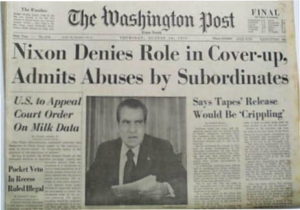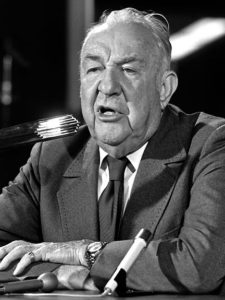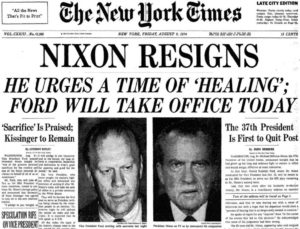
Richard Nixon was in tall cotton in 1972. His overall approval rating with the public was respectable. His opponent, George McGovern, was so far to the left that he had alienated many Democrats. It should have been an easy ride into his second term as President.
Only it wasn’t. Sure, he won the election with a monstrous landslide, but it turns out that there was something brewing in the background that would eventually explode into the biggest political scandal of the 20th century, quite an accomplishment, considering that it would make us forget all about Warren Harding’s infamous Ohio Gang. In fact, the scandal would come to dominate the news for two years, and cost the next President an election thanks to a pardon of, in the opinion of many, the head instigator of the whole mess.
The Watergate scandal began with an unremarkable burglary which took place on June 17, 1972. A security guard at the Watergate Complex noticed that someone had taped the latches on a few doors. He removed the tape, only to find that it had been replaced again afterwards. The guard called police, and five men were arrested inside the Democratic National Committee’s office located at the complex.

On January 30, 1973, the five men were tried and convicted. It turns out that they all had ties to the Committee to Reelect the President (officially known as CRP, but many in the news and late-night talk shows had fun calling it CREEP). In March, 1973, one of the five, James McCord, wrote a letter to the judge who had convicted him, John Sirica, claiming that he was pressured into pleading guilty, and that forces over his head were actually responsible for the break-in. Sirica read the letter in court, with many reporters present, and the race was on to find out more.
As the investigations progressed, it was learned that the burglars had received large sums of money, which were eventually traced back to CRP. John Mitchell, head of CRP, denied knowing anything about it.
This would be a statement repeated endlessly by nearly all who would be proven to be involved, and imprisoned. As they say, “The first liar ain’t got a chance.”
One of the burglars, Bernard Baker, had a company in Miami that was used to funnel the checks from CRP in an effort to launder them, removing any traceability back to the committee. Turns out that the Miami banks involved were found innocent of any malfeasance, the blame was instead placed on a number of CRP officials, including G. Gordon Liddy, Jeb Magruder, Hugh Stone, and Maurice Stans.
Prior to the trial and conviction of the burglars, in fact before the 1972 election, it was revealed on September 29 that John Mitchell controlled a secret fund used to finance intelligence-gathering against the Democrats. On October 10, the FBI reported that the Watergate break-in was part of a huge operation of political spying and sabotage on behalf of CRP.
This didn’t faze the public, who still preferred Nixon over the far-left-leaning McGovern. One wonders how history might have turned out if the Dems had chosen a more moderate candidate. The aforementioned landslide took place on the first Tuesday of November.
However, as more and more revelations began to come forth, the pressure began to mount on President Nixon himself.
Reporters aggressively pursued the connections between the burglary and the higher powers, particularly Carl Bernstein and Bob Woodward of the Washington Post. Their investigations revealed that the scandal reached all the way into the Justice Department, the FBI, the CIA, and the White House itself.

All of those stories appearing in Washington DC’s biggest paper had their effect on the Senate. Sam Ervin, the gentlemanly senator from North Carolina, was set up as chairman of a committee to get to the bottom of the burglary and the conspiracies behind it.
Nixon had to replace disgraced Attorney General Mitchell, and did so with Elliot Richardson. Richardson then appointed Archibald Cox as an independent special counsel to the Watergate investigation.
The hearings took place on daytime TV from May 17 to August 7, 1973. On Friday the 13th of July, it was revealed that the White House had a tape recording system in place that automatically captured conversations inside the Oval Office, as well as other rooms. Cox immediately subpoenaed the tapes, and the White House was compelled to dig them up. Nixon refused, stating that the tapes were his personal property, exempt from the investigation. Cox refused to back down, and Nixon demanded his head on a pole.
Nixon canned Richardson, who refused to fire Cox, and replace him with Robert Bork, who promptly did his master’s bidding. Cox was replaced by Leon Jaworski. Transcripts of some of the tapes were eventually provided by the White House, although parts of them had been erased, particularly one eighteen-and-a-half minute section which was allegedly done accidentally by Nixon’s secretary. The press had fun demonstrating just how difficult that would have been for her, supposedly keeping her foot on a pedal in an uncomfortable position while talking on the phone.

On July 24, 1974, the Supreme Court ordered the tapes to be turned over. One of the tapes proved that statements that Nixon had earlier made concerning the involvement of the CIA pressuring the FBI were not true, and also implied the President pretty clearly in being knowledgeable of the whole operation. Impeachment proceedings were begun.
The writing was on the wall. On August 8, Nixon announced his resignation.
President Gerald Ford, on September 8, issued a pardon of Nixon, immunizing him from prosecution for any crimes he had “committed or may have committed or taken part in” as President. He explained that he did it to heal the nation, and he may well have been altruistic in his intentions, but by and large the country was angered that justice wasn’t being done. The Senate gained five Democratic seats and Congress gained 49 themselves that election year. Ford was soundly defeated by Jimmy Carter three years later.
Seven officials were tried, one was found innocent, the others, Robert Mardian, Chuck Colson, H.R. Haledeman, John Erlichman, John Mitchell, and Gordon Strachan, were found guilty and did prison time. John Dean and Jeb Magruder pleaded guilty in their own trials. A number of others were also convicted of lying to the grand jury.
Thus ended one of the sorriest sagas of US history. It seems that any scandal that comes along these days has “gate” added to the end of its name. Nixon had some admirable accomplishments during his tenure, but Watergate cast a long, black shadow over everything else he did. The White House tapes were intended to provide a record of his Presidency. They did so, but I don’t think that’s what he had in mind.